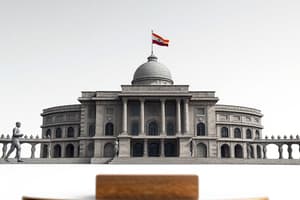Podcast
Questions and Answers
How are the rights under Article 19(1) limited?
How are the rights under Article 19(1) limited?
The rights are limited by reasonable restrictions defined in clauses 2–6 under Article 19, including grounds of decency, morality, public order, friendly relations with foreign countries, and the unity and integrity of India.
What rights are granted to citizens under Article 19(1) of the Indian constitution?
What rights are granted to citizens under Article 19(1) of the Indian constitution?
The right to freedom of speech and expression, to assemble peacefully, to form unions or associations, to move freely throughout the territory of India, and to practice any trade or profession.
What does Article 20 of the Indian constitution state regarding criminal legislation?
What does Article 20 of the Indian constitution state regarding criminal legislation?
Article 20 states that criminal legislation cannot be implemented retrospectively, meaning a criminal can be punished for the crime that prevails on the day of the offence.
Who judges the reasonableness of restrictions imposed by the state?
Who judges the reasonableness of restrictions imposed by the state?
What is the purpose of the reasonable restrictions under Article 19(1) of the Indian constitution?
What is the purpose of the reasonable restrictions under Article 19(1) of the Indian constitution?
Flashcards are hidden until you start studying
Study Notes
Article 19(1) Rights and Limitations
- Article 19(1) of the Indian Constitution grants fundamental rights to citizens, including the right to freedom of speech and expression, assembly, association, movement, residence, and profession.
- These rights are subject to “reasonable restrictions” imposed by the state for specific purposes such as public order, decency, morality, and other considerations of state security.
Reasonableness of Restrictions
- The Supreme Court of India and also the High Courts are responsible for judging the reasonableness of restrictions placed on the rights granted under Article 19(1).
- The judiciary evaluates if restrictions serve a legitimate goal and if the means used are proportionate to the ends.
Purpose of Reasonable Restrictions
- The purpose of reasonable restrictions is to balance individual rights with the interests of the community and to ensure the exercise of rights does not infringe upon the rights or safety of others.
- Restrictions are designed to maintain social order and protect public interests without completely negating individual freedoms.
Article 20 and Criminal Legislation
- Article 20 of the Indian Constitution provides specific protections in criminal legislation, ensuring:
- No person shall be convicted of an offense except for violation of a law in force at the time of the commission of the act.
- No person shall be punished with a penalty greater than what was prescribed at the time of the offense.
- There shall be no double jeopardy, meaning a person cannot be tried twice for the same offense.
Conclusion
- Articles 19 and 20 together establish key safeguards for individual liberties while also recognizing and allowing for necessary restrictions to promote societal welfare and justice.
Studying That Suits You
Use AI to generate personalized quizzes and flashcards to suit your learning preferences.



